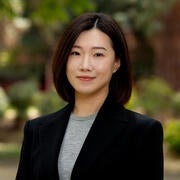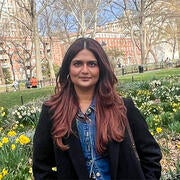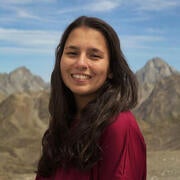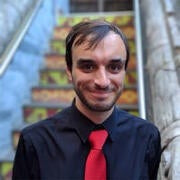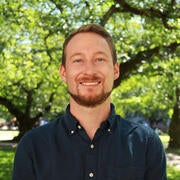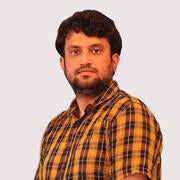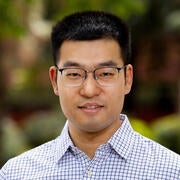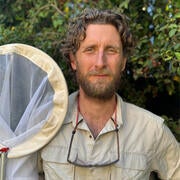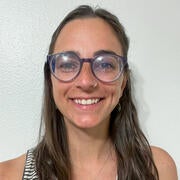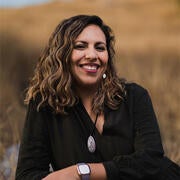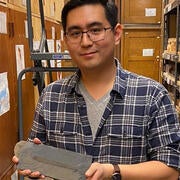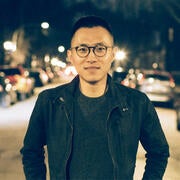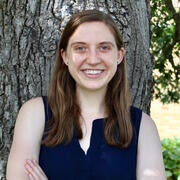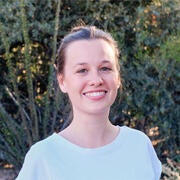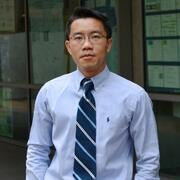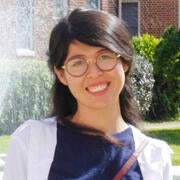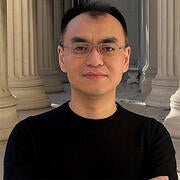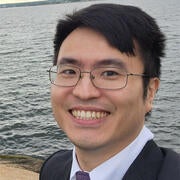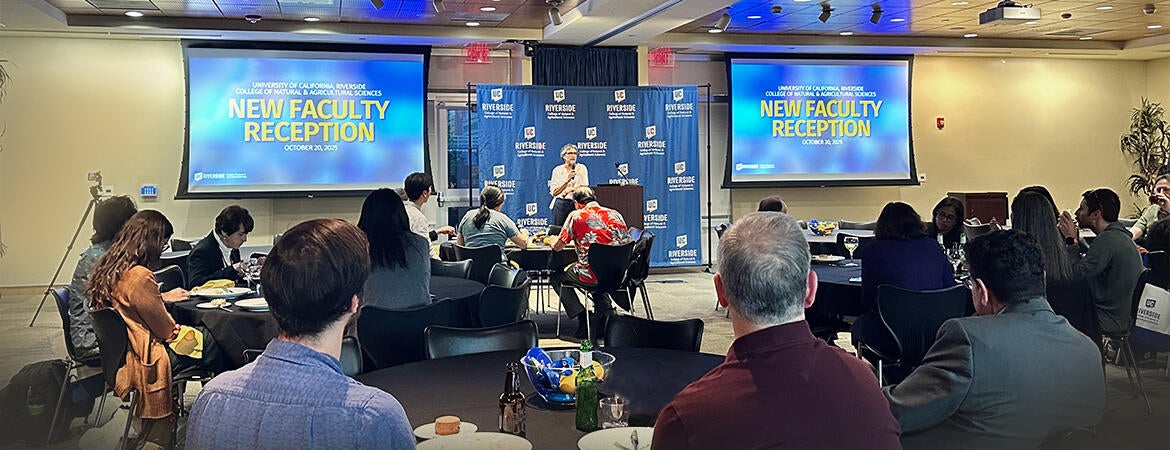
The College of Natural & Agricultural Sciences (CNAS) welcomed its newest faculty on October 20, hosting a full day of events designed to connect them with the CNAS community.
The program began at noon with the CNAS New Faculty Orientation in HUB 269, continued with a campus tour led by the CNAS Science Ambassadors, and concluded with an evening New Faculty Reception at the Alumni and Visitors Center.
Meet the 2025 CNAS New Faculty Members
Yifan Dong, an assistant professor of physical chemistry, received her doctorate in chemistry from Imperial College London and completed a postdoc at the National Renewable Energy Laboratory. Her research group develops versatile ultrafast spectroscopy platforms, spanning optical to terahertz (THz) frequencies, to probe charge and spin dynamics in emerging semiconductors. By bridging fundamental spectroscopy with materials design, her team seeks to reveal the mechanisms that enable efficient energy conversion and spin control in next-generation optoelectronic and spintronic devices.
Pooja Flora, an assistant professor in the Department of Molecular, Cell and Systems Biology, received her doctorate in biological sciences from the University at Albany, SUNY. She trained as a postdoctoral fellow at the Icahn School of Medicine at Mount Sinai. Her research focuses on the role of epigenetic and chromatin-based mechanisms in regulating epithelial stem cell function and tissue longevity. Her lab uses comparative and multi-omics approaches to uncover how conserved chromatin regulators safeguard cell identity, regeneration, and long-term tissue health.
Ludmila Fonseca Teixeira, an assistant professor of economic geology, received her doctorate from ETH Zurich in Switzerland. Her research focuses on understanding the genetic processes and conditions that control the concentration (or absence) of critical minerals in magmatic rocks, particularly those of high-silica composition. She has worked as a postdoctoral fellow at the Smithsonian National Museum of Natural History. She will join the faculty in April 2026.
Tom Gannon, an assistant professor of mathematics, received his doctorate from the University of Texas at Austin. His work applies algebraic geometry to study questions that arise in mathematical physics. Prior to joining UCR, he was an assistant adjunct professor at UCLA.
Fabian Klenner, an assistant professor of planetary sciences, received his doctorate from Freie Universität Berlin in Germany. He has applied his research around icy ocean worlds in the solar system in planning for various space missions. His research group combines laboratory experiments, computer simulations, and spacecraft observations to address astrobiological questions about extraterrestrial geochemical processes and the detection of life beyond Earth. He will join the faculty in December.
Salil Koner, an assistant professor of statistics, received his doctorate in statistics from North Carolina State University, Raleigh. Before joining UCR, he completed a postdoctoral fellowship at Duke University. His research focuses on uncertainty quantification and valid inference for complex, high-dimensional clinical trajectories and neuroimaging data, with applications to aging disorders such as Alzheimer’s and Parkinson’s diseases.
Suqi Liu, an assistant professor of statistics, received his doctorate from Princeton University. His research interests span the theoretical foundations and practical applications of probability, statistics, machine learning, and data science. He focuses on complex structured health data, including biomedical networks, genomic sequences, and clinical notes.
Zachary MacDonald, an assistant professor of conservation genomics and biodiversity in the entomology department, received his doctorate in ecology from the University of Alberta. His research examines ecological and evolutionary mechanisms that structure biodiversity in space and time, focusing on cryptic diversity, speciation, and insect conservation across western North America. His lab aims to identify and document hidden diversity , clarify processes shaping genetic variation, and translate these insights into conservation. MacDonald’sHis long-term goal is to build comprehensive multispecies genomic datasets for insects, creating tools to guide biodiversity protection across North America and beyond.
Lindsay McCulloch, an assistant professor of teaching, received her doctorate in ecology and evolutionary biology from Brown University. Her research focuses on plant-microbe interactions, biogeochemical cycling, tropical forest restoration, and plant-soil dynamics. She has studied the environmental factors that influence plant-microbial interactions in tropical rainforests and researched seed-fungal interactions in Panama.
Adriana Romero-Olivares, an assistant professor in the Department of Evolution, Ecology, and Organismal Biology, received her doctorate in biological sciences from UC Irvine. She investigates how fungi respond to environmental stress and how these responses influence our ecosystems and society. Her research integrates experimental ecology, traditional microbiology, and genomics to understand and predict ecosystem resilience in a changing climate. She was previously an assistant professor at New Mexico State University. She will join the faculty in January.
Karma Nanglu, an assistant professor of evolutionary paleobiology in the Department of Earth and Planetary Sciences, received his doctorate in ecology and evolutionary biology from the University of Toronto. His research focuses on the early diversification of animal life, as recorded by fossils with exceptional soft-tissue preservation. He does so through specimen-based research, integrating field work, museum collections, and quantitative methods. He also studies the broader ecosystems in which these animals evolved through the lens of community ecology.
Pei Su, an assistant professor of biochemistry, received his doctorate in analytical chemistry from Purdue University. His research is at the interface of analytical chemistry, mass spectrometry, instrumentation, bioinformatics, and protein biochemistry. At UC Riverside, he will be leading the Laboratory of Integrative Proteoform Biology to study how cellular metabolism shapes the immune system.
Morgan Thompson, an assistant professor of entomology, received her doctorate from Texas A&M University. Her research integrates chemical, molecular, and community ecology to understand plant-insect interactions. She examines how plants defend against herbivores and their effects on surrounding ecological communities. Her research reveals sustainable and environmentally friendly strategies for altering insect pest behavior and enhancing plant protection in natural and agricultural ecosystems. She will join the faculty in January.
Joana Voigt, an assistant professor of planetary science, received her doctorate in planetary sciences from the University of Arizona's Lunar and Planetary Laboratory. Her research focuses on effusive volcanism on Earth and Mars, and the interactions between water and rock within volcanic terrains. Her work aims to clarify the relationship between eruption dynamics and the characteristics of surfaces and shallow sub surfaces of effusive eruptions. Her research employs methodologies including orbital remote sensing techniques and instruments, unoccupied aircraft systems and field observations, particularly in terrains similar to Martian environments. She will join the faculty in January.
Bryan Wong, a full professor in the Department of Chemistry, received his doctorate in physical chemistry at MIT. Wong's research focuses on developing and applying quantum-mechanical computational techniques to predict, understand, and rationally design chemical/material systems (either previously synthesized or yet to be made). Wong is the recipient of a Department of Energy (DOE) Early Career Award, an R&D 100 Award, the ACS COMP Outstanding Junior Faculty Award, and a 2022 HPCWire Award for quantum dynamics calculations. Wong is the lead PI on a new DOE SciDAC center at UC Riverside on large-scale quantum dynamics calculations for chemical/material systems.
Yue Jane Wu, an assistant professor of chemistry, received her doctorate in chemistry and biochemistry from the Georgia Institute of Technology. She completed her postdoctoral fellowship at Harvard University, where she integrated nanodevice fabrication, optical imaging, and single-cell omics to develop innovative approaches for studying cellular heterogeneity. Wu’s group aims to advance high-throughput bioanalytical chemistry by creating optical and molecular barcoding technologies that connect high-content imaging with single-cell analysis. They seek to uncover new insights into immune cell function, genetic perturbation responses, and complex biological systems through interdisciplinary methods spanning analytical chemistry, materials science, and systems biology.
Qiguo Yu, an assistant professor in the Department of Botany and Plant Sciences, received his doctorate in plant biology from Rutgers University. He completed postdoctoral training at Massachusetts Institute of Technology. His research focuses on engineering plants, notably the chloroplast organelle, with an emphasis on developing new genetic tools and strategies for engineering complex pathways (such as carbon fixation, nitrogen fixation) in plant plastids.
Jeffrey Zhang, an assistant professor of statistics, received his doctorate in operations research and engineering from Princeton University. He studied solutions to optimization problems and now researches higher order optimization and biomedical applications for large language models in mental health and hospital operations.
This fall’s CNAS New Faculty events welcomed about half of the college’s incoming faculty; additional CNAS scholars with 2026 start dates will be introduced at a winter quarter orientation and reception.
Building Community and Collaboration
The CNAS New Faculty Orientation emphasized the importance of collaboration and community across CNAS, helping new faculty build the relationships and resources that will support their success at UC Riverside.
“Welcome, and thank you for choosing CNAS and UC Riverside as your new home,” said CNAS Dean Peter Atkinson in his opening remarks. “The college and each department have fantastic faculty and staff who offer tremendous expertise to help you succeed.”
Divisional Dean of Life Sciences, Morris Maduro, served as emcee and set a lighthearted tone. “We’ve got a lot of ground to cover,” he told the group. “It’s going to be like drinking from a fire hose of information!”
The orientation offered an invaluable primer on key areas of the college, featuring presentations from leaders across CNAS who shared insights, resources, and advice to help new faculty hit the ground running. Speakers included:
- CNAS Student Academic Affairs – Stephanie Dingwall, CNAS Divisional Dean
- Physical Sciences and Mathematics – Stefano Vidussi, CNAS Divisional Dean
- Life Sciences – Morris Maduro, CNAS Divisional Dean
- Agriculture & Natural Resources – Patricia Springer, CNAS Divisional Dean
- CNAS Graduate Student Affairs Center (GSAC) and CNAS Enrollment Management Center – Nikita McWells, Assistant Dean
- Undergraduate Academic Advising Center (UAAC) and Success Center – Brett McFarlane, Assistant Dean
- Academic Personnel Services Unit (APSU) – Joyleen Salas, Director
- Advancement and Retention in Academe (ARA) – Patricia Springer, CNAS Divisional Dean, Agriculture and Natural Resources
- Communications – Joann Young, Assistant Dean, Communications and Strategic Initiatives
- Budget and Administrative Units – Jennifer Farias, Special Advisor to the Dean
- Facilities – Sabrina Shuster, CNAS Facilities Liaison
- Grant Facilitation – Constanze Ditterich, CNAS Senior Grant Facilitator
- Development – Robyn Martinelli, Assistant Dean
A Warm Welcome and Shared Mission
The CNAS New Faculty Reception provided a relaxed setting for conversation, connection, and celebration—giving everyone time to mingle, share ideas, and get to know one another.
During her remarks, UCR Provost and Executive Vice Chancellor Elizabeth Watkins commended the college’s collaborative spirit. “CNAS brings everyone together in an impressive way,” she said. “I want new faculty to know that they’re entering a world where colleagues really care about you and want you to be successful.”
“We are crystal clear about our mission here at UCR,” she continued. “That does not and will not change. We are about research excellence, access, social mobility, student success, and serving our community. That’s what this campus was built upon.”
Before closing, Provost Watkins encouraged the new faculty to reflect on what that mission means to them: “Do what you came here to do,” she said.
CNAS looks forward to welcoming the remaining cohort of new faculty at the winter 2026 orientation and reception, as the college continues to grow its dynamic community of scholars dedicated to research, teaching, and discovery.
View Photos from the Reception
